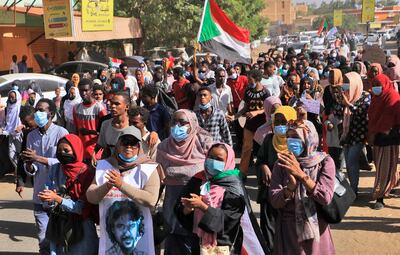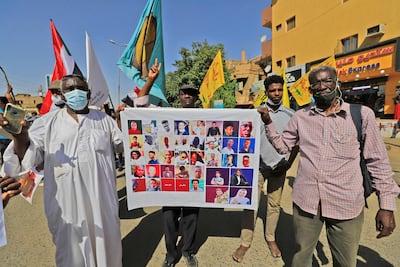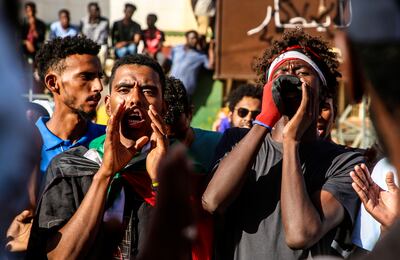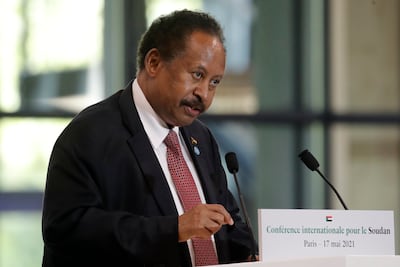Police used tear gas to disperse tens of thousands who marched on the presidential palace in Khartoum on Tuesday to demand that Sudan's military leave politics.
The march was about 500 metres away from the Nile-side palace in the heart of the capital when the teargas was used. Hundreds of police officers had surrounded the palace as the protesters drew closer, witnesses told The National.
Tuesday's march was called to protest against the military’s growing political role following the October 25 coup and a deal that reinstated the prime minister a month after his removal by top army figure, Gen Abdel Fattah Al Burhan. The coup upended Sudan's democratic transition, ending a partnership with civilian, pro-democracy political forces enshrined in a power-sharing deal reached in 2019.
The crowds had gathered earlier on Tuesday in the capital's residential neighbourhoods before they began their march towards the palace, chanting anti-military slogans and waving national flags.
“The people want the regime to fall,” they chanted. “Power to the people,” they shouted. “No negotiations; no partnership!” read one banner carried by the protesters.

Police in convoys of up to 10 armoured cars roamed the streets around the palace before the arrival of the protesters. Others sat in large lorries stationed nearby.
All Nile bridges linking the city's three boroughs remained open, unlike on previous days of protest, when they were closed from the night before.
"We want a totally civilian regime built on the revolution's slogan of freedom, peace and justice," said one protester, a 25-year-old businessman who wanted to be identified only by his first name, Mustafa.
"We are the generation that will stop Sudan's cycle of coups. The military will never rule us again," he shouted so he could be heard over the chanting and women ululating.
Tuesday’s rallies, organised by Khartoum’s resistance committees, will add to pressure on Abdalla Hamdok, the prime minister removed by the coup but reinstated on November 21, to do more to reassure the Sudanese that his return to office will restore the democratic transition.
Mr Hamdok, a British-educated economist, was placed under house arrest by Gen Al Burhan.
His detention and dismissal made his popularity soar. However, the deal he struck with the military has turned him overnight from a popular hero into a man thought to have betrayed the people and their revolution against dictator Omar Al Bashir in 2018-19.
A career UN economist before becoming prime minister in 2019, Mr Hamdok has been seeking to subtly distance himself from the military since the deal, emphasising his independence.
He instructed the police and security agencies to protect rather than clash with peaceful protesters. At the weekend, he fired the police chief and his deputy in what appeared to be a response to the use of excessive use of force against protesters in the four weeks since the coup.

At least 43 have been killed and hundreds injured since October 25, according to a doctors' association linked to the pro-democracy movement, whose figures have in the past proved reliable.
It said the death toll rose when a 21-year-old man died on Tuesday of a brain haemorrhage after policemen beat him on the head with truncheons during street protests on November 25.
“No one gifted us the right to demonstrate. Our people gained that right over decades of struggle,” Mr Hamdok wrote on Facebook late on Monday. In defence of his deal with the military, he said: “The basic value and main challenge of the agreement is its implementation.”
Mr Hamdok, however, has remained silent on the fait accompli created by Gen Al Burhan after his coup, which enshrined the military as the ultimate source of power and guardian of the transition until elections promised for 2023.

He has named himself the country’s de facto leader and appointed a new Sovereign Council of generals and little-known civilians, who replaced representatives of the powerful pro-democracy movement that signed a power-sharing deal with the military after ousting Al Bashir in April 2019.
“Instead of (Mr Hamdok) ascending to this position on the shoulders of the popular will, he was content to take it on the back of a tank,” Omar El Degeir, leader of the Sudan Congress Party, told a news conference on Monday. “Hamdok knows from the evidence history shows us is that it’s the people's will that prevails, not the tank.” Mr El Degeir and several prominent politicians and activists who were detained by the military and later released took part in Tuesday’s rallies.
But Sulaima Ishaq, a prominent activist and a women’s rights campaigner, believes opposition to Mr Hamdok runs much deeper among politicians such as Mr El Degeir than with the grass roots of the pro-democracy movement.
Their quarrel, she explained, is mostly with the military.

“To many of them, he’s ’s like a partner that you broke up with but continue to love. You cannot bring yourself to hate him but you are really upset with him,” she said. “Regardless of the deal, he remains the man of the people.”
Mr Hamdok has been instrumental in overhauling Sudan’s battered economy and was able to persuade a large majority of the Sudanese to endure steep rises in the price of basic goods, such as fuel, as a result of his ambitious reforms.
He said he had agreed to be reinstated to save the country from sliding into chaos, protect the transition and the modest economic gains made in recent months.
He has also negotiated the lifting of international sanctions slapped on Sudan during Al Bashir’s 29-year rule when the country was a pariah state for its links to extremist groups and atrocities in the war against rebels in the western Darfur region.
Moreover, Sudan was on the cusp of foreign debt forgiveness to the tune of $50 billion before the coup, which was internationally condemned and led to the suspension of hundreds of millions of dollars’ worth of aid.

